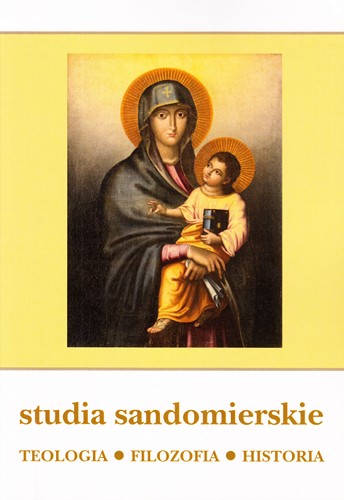Saint Thomas Aquinas’ Answer to the Contemporary Loss of the Consciousness of Sin
DOI:
https://doi.org/10.15633/sts.3865Keywords:
sin, relativism, morality, natural law, awareness, natureAbstract
Currently, especially in Europe, we are dealing with progressive and rapidly deepening secularization. As a result, the sources of morality, i.e., family, school, and the Church have gradually begun to lose their authoritative significance. This, in turn, leads to extremely subjective attitudes. Therefore, the loss of the consciousness of sin is another consequence of the above-mentioned processes. The sources of the moral anesthesia are the deepening crisis of faith, the domination of subjective attitudes, and a wrong concept of the Church. Contemporary man ceases to seek the unchanging moral norms that have shaped European societies for centuries, because he himself wants to become their only source and determinant.
The still valid teaching of St. Thomas Aquinas brings us an antidote to the illnesses that torment modern man. The return to realism and cognitive objectivity, as the correct way of perceiving reality and the acceptance of the person of God as the authentic source of the moral law are the best ways of regaining the lost consciousness of sin.References
Źródła drukowane
Jan Paweł II, Centesimus annus, Wrocław 1991.
Jan Paweł II, Gratissimam sane, Poznań 1994.
Jan Paweł II, Homilia w czasie Mszy św. beatyfikacyjnej Anieli Salawy, odprawionej na Rynku Głównym (Kraków, 13 sierpnia 1991), opoka.org.pl/biblioteka/W/WP/jan_pawel_ii/homilie/50krakow_13081991.html [dostęp: 28 IX 2020 r.].
Jan Paweł II, Reconciliatio et paenitentia, w: Adhortacje Jana Pawła II, t. 1, Kraków 1996.
Jan Paweł II, Veritatis splendor, Wrocław 1993.
Katechizm Kościoła katolickiego, Poznań 2002.
Pius XII, Summi pontificatus, Warszawa 1998.
Ratzinger J., Ku „dojrzałości” wiary w Chrystusa. 18 IV 2005 – Homilia kard. Josepha Ratzingera podczas Mszy św. „pro eligendo Romano Pontifice”, opoka.org.pl/biblioteka/W/WR/inne/ratzinger_proeligendo_18042005.html [28 IX 2020 r.].
Sobór Watykański II, Konstytucja dogmatyczna o Kościele „Lumen gentium”, w: Sobór Watykański II. Konstytucje, dekrety, deklaracje, Poznań 2002, s. 104–166.
Tomasz z Akwinu, Byt i istota, tłum. W. Sieńko, Warszawa 1978.
Tomasz z Akwinu, Kwestie dyskutowane o prawdzie, t. 1, tłum. A. Aduszkiewicz, L. Kuczyński, J. Ruszczyński, Kęty 1998.
Tomasz z Akwinu, Suma teologiczna, tłum. P. Bełch, London 1986.
Tomasz z Akwinu, Summa contra gentiles. Prawda wiary chrześcijańskiej w dyskusji z poganami, innowiercami i błądzącymi, t. 1, tłum. Z. Włodek, W. Zega, Poznań 2003; t. 2, tłum. Z. Włodek, W. Zega, Poznań 2007.
Tomasz z Akwinu, Summa theologiae, San Paolo 1988.
Tomasz z Akwinu, Wykład pacierza, tłum. W. Giertych, K. Suszyło, M. Starowieyski, Poznań 2005.
Opracowania
Barber B., Skonsumowani, tłum. H. Jankowska, Warszawa 2009.
Fromm E., Ucieczka od wolności, tłum. O. i A. Ziemilscy, Warszawa 2008.
Gaworek. S., Utracony blask, Warszawa 2011.
Gilson É., Byt i istota, tłum. B. Eska, J. Nowak, Warszawa 1962.
Heath R., Ukryta moc reklamy. Co tak naprawdę wpływa na wybór marki?, tłum. A. Nowak, Gdańsk 2006.
Jan Paweł II, Pamięć i tożsamość, Kraków 2005.
Mattei R. de, Dyktatura relatywizmu, tłum. P. Toboła-Pertkiewicz, E. Turlińska, Warszawa 2009.
Ratzinger J., Bóg i świat, tłum. G. Sowiński, Karków 2005.
Ratzinger J., Nowa pieśń dla Pana, tłum. J. Zychowicz, Kraków 2005.
Ratzinger. J, Raport o stanie wiary, tłum. Z. Oryszyn, Warszawa-Struga, 1986.
Salij J., Prawo naturalne i prawa stanowione w ujęciu św. Tomasza z Akwinu, „Łódzkie Studia Teologiczne” 26 (2007), nr 2, s. 103–110.
Swieżawski S., Dzieje europejskiej filozofii klasycznej, Warszawa–Wrocław 2000.
Downloads
Published
Issue
Section
License
Copyright (c) 2021 Marcin Bodziak

This work is licensed under a Creative Commons Attribution-NonCommercial-NoDerivatives 4.0 International License.
Authors who publish with this journal agree to the following terms:
- Authors retain the copyright and full publishing rights without restrictions, and grant the journal right of first publication with the work simultaneously licensed under a Creative Commons Attribution 4.0 International License that allows others to share the work with an acknowledgement of the work's authorship and initial publication in this journal.
- Authors are able to enter into separate, additional contractual arrangements for the non-exclusive distribution of the journal's published version of the work (e.g., post it to an institutional repository or publish it in a book), with an acknowledgement of its initial publication in this journal.
- Authors are permitted and encouraged to post their work online (e.g., in institutional repositories or on their website) prior to and during the submission process, as it can lead to productive exchanges, as well as earlier and greater citation of published work (See The Effect of Open Access).

